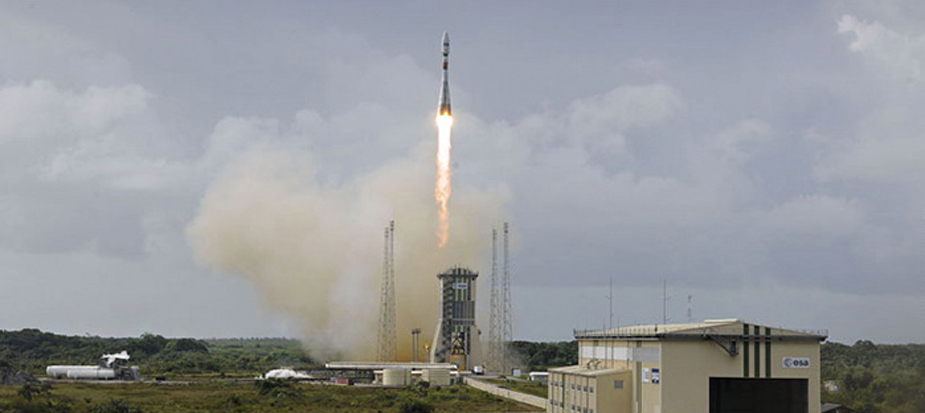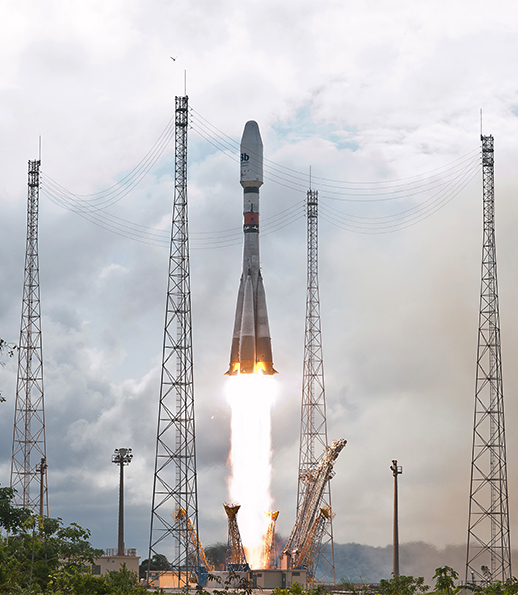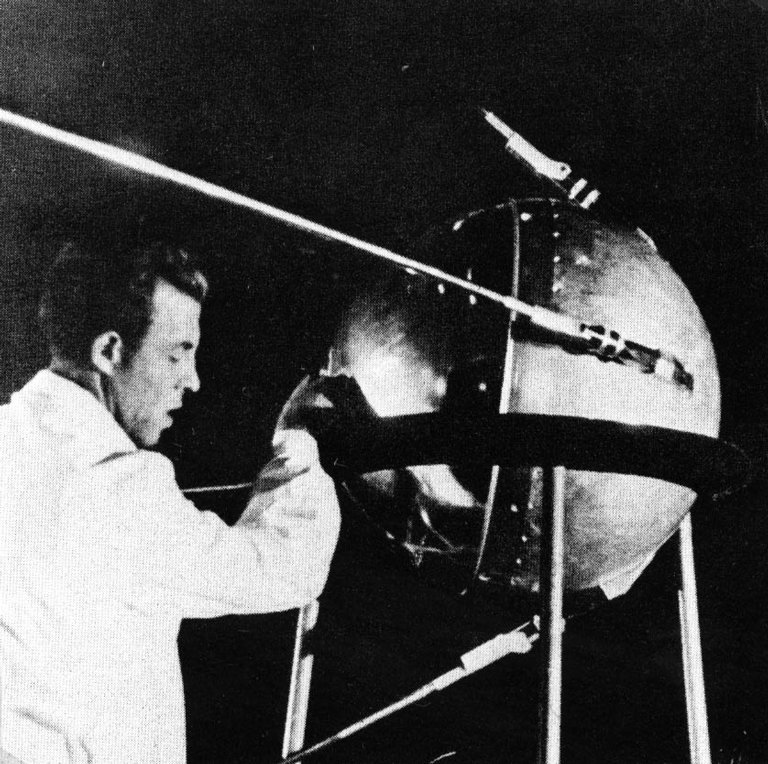Soyuz Rocket Launches 4 Communications Satellites Into Space

PARIS — A Europeanized Russian Soyuz rocket on Thursday (July 10) successfully placed four O3b Networks Ka-band broadband satellites into their unusual medium Earth orbit in the second of three planned four-satellite launches for the company. The third launch is scheduled for early next year.
Operating from Europe's Guiana Space Center on the northeast coast of South America, the Soyuz-Fregat vehicle separated the satellites two at a time into an orbit with an altitude of some 7,836 kilometers.
O3b Chief Executive Steve Collar said shortly thereafter that ground teams had picked up signals from all four satellites. [Amazing Rocket Launches of 2014]
The satellites will use their own propulsion systems to reach their final operating positions at 8,062 kilometers in altitude, inclined at 0.4 degrees relative to the equator. Orbit-raising and satellite system testing are expected to take about three weeks.
The O3b orbit is close enough to Earth's surface to reduce the latency involved in sending signals to and from satellites in geostationary orbit at 36,000 kilometers above the equator.

Satellite fleet operator SES of Luxembourg is a major O3b shareholder and has said that once the O3b business model is proven, it intends to move toward majority ownership of the company, which will provide Internet backbone and other services on a wholesale basis in the world's equatorial regions. SES officials have said the frequency and orbital rights that O3b has — no one else uses this orbit — are such that more than 100 O3b satellites could be launched to provide ever-more throughput and require less work on the part of the steerable ground antennas that follow one satellite before picking up another to assure data continuity.
The O3b satellites each weigh about 700 kilograms at launch and were built by Thales Alenia Space of France and Italy, which has made a specialty of manufacturing low orbiting constellations with the help of France's export-credit agency, Coface, which has provided low-interest loans to satellite fleet operators.
Breaking space news, the latest updates on rocket launches, skywatching events and more!
Thales Alenia Space also built major portions of the first- and second-generation spacecraft for the Globalstar mobile communications network, and is under contract to build 81 second-generation satellites for mobile satellite services provider Iridium.
O3b, based in Britain's Channel Islands, has already started limited commercial operations with its first four satellites, which launched in June 2013, despite a power defect that does not affect their performance but is expected to shorten their contractual 10-year operating life.
The issue prompted the company to file a claim with its insurance underwriters for about $240 million; a separate claim for another $81 million was filed more recently and is still being reviewed by the insurers.
Industry officials said it is uncertain when the satellites' power will fall to levels that materially degrade service quality. That is not yet the case, but the situation has increased the pressure to get more satellites on orbit and thus created tensions with the executive commission of the European Union, which wanted its own Galileo positioning, navigation and timing satellites to be launched aboard the Soyuz ahead of O3b.

The on-board power problem forced O3b to forego a 2013 launch on the Soyuz, and upended Arianespace's planned 2013 flight manifest and revenue forecast. The European Union's Galileo network faced similar satellite-delivery delays, pushing its launches to 2014. The first of those Galileo launches is now scheduled for late August, with second slated for late this year.
But O3b and SES officials in recent weeks have maintained pressure on Arianespace for a late-2014 launch, which likely would mean pushing Galileo into 2015.
Follow Peter on Twitter: @pbdes. This story was provided by SpaceNews, dedicated to covering all aspects of the space industry.
Join our Space Forums to keep talking space on the latest missions, night sky and more! And if you have a news tip, correction or comment, let us know at: community@space.com.
Peter B. de Selding is the co-founder and chief editor of SpaceIntelReport.com, a website dedicated to the latest space industry news and developments that launched in 2017. Prior to founding SpaceIntelReport, Peter spent 26 years as the Paris bureau chief for SpaceNews, an industry publication. At SpaceNews, Peter covered the commercial satellite, launch and international space market. He continues that work at SpaceIntelReport. You can follow Peter's latest project on Twitter at @pbdes.

